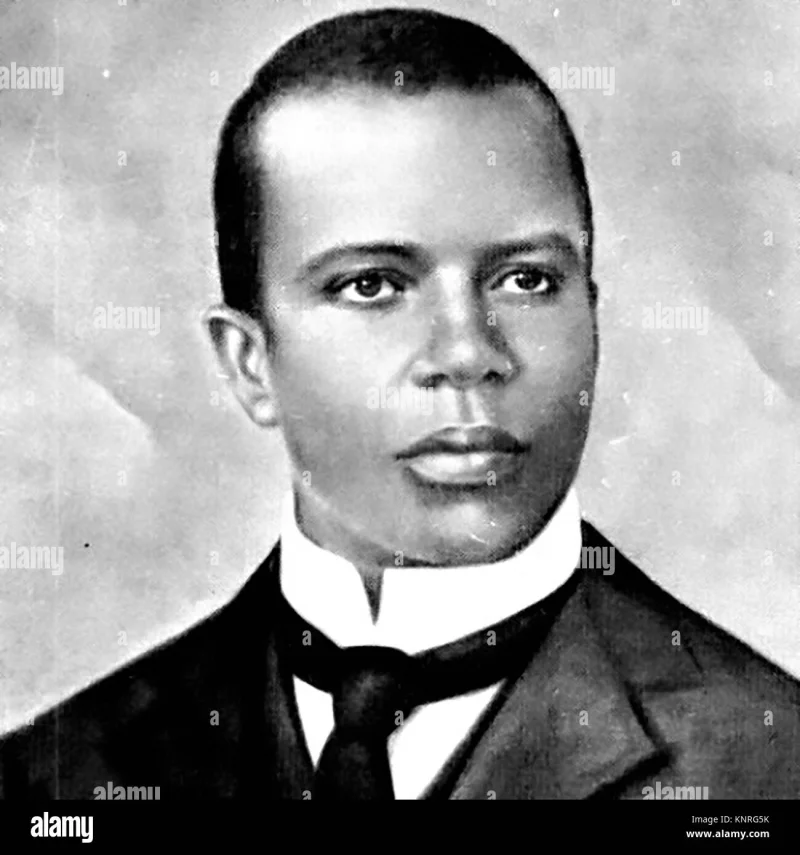Short Summary
Scott Joplin was an influential American composer and pianist, renowned for his significant contributions to the ragtime genre. His music, characterized by its syncopated rhythms and unique melodic style, played a crucial role in popularizing ragtime in the late 19th and early 20th centuries. Joplin's most famous piece, "The Maple Leaf Rag," remains a quintessential example of ragtime music. His work laid the foundation for future developments in American music, influencing jazz and other popular genres.
Early Life & Education
Scott Joplin was born in 1868 in Northeast Texas, although the exact date remains uncertain. He was the second of six children in a musical family; his father, Giles, was a former slave who played the violin, while his mother, Florence, sang and played the banjo. The family moved to Texarkana, where Joplin received his early musical education. He was taught piano by local music teachers, including the German-born Julius Weiss, who recognized Joplin's talent and provided him with a formal music education. Weiss's tutelage and his family's musical background significantly influenced Joplin's development as a musician.
Career Highlights
Joplin's career took off in the late 1890s when he moved to Sedalia, Missouri, a hub for ragtime music. There, he published "The Maple Leaf Rag" in 1899, which became a massive success and solidified his reputation as the "King of Ragtime." He continued to write numerous compositions, including "The Entertainer" and "The Easy Winners." Joplin also ventured into operatic compositions, with his most ambitious work being the opera "Treemonisha." Despite facing challenges in getting his operas performed, his relentless dedication to his art solidified his legacy as a pioneering composer.
Major Achievements
- Published "The Maple Leaf Rag" in 1899, establishing him as a leading ragtime composer.
- Composed "The Entertainer," which became widely recognized and revived in the 1970s.
- Wrote the opera "Treemonisha," reflecting his desire to elevate ragtime to a more respected art form.
- Influenced future generations of musicians and composers, paving the way for jazz and popular music.
Famous Quotes
- "It is never right to play ragtime fast."
- "Ragtime music is a genre that will always last."
Interesting Facts
- Joplin was posthumously awarded a Pulitzer Prize in 1976 for his contributions to American music.
- "The Maple Leaf Rag" was one of the first pieces of sheet music to sell over a million copies.
- He was inducted into the Songwriters Hall of Fame in 1970.
- Joplin's music experienced a revival in the 1970s, largely due to its inclusion in the film "The Sting."
- Despite his success, Joplin died in relative obscurity in 1917.
Legacy / Influence
Scott Joplin's influence on American music is profound. His pioneering work in the ragtime genre laid the groundwork for the development of jazz and other popular music forms. Joplin's compositions have endured through the decades, continuing to be celebrated and performed. His efforts to elevate ragtime to an art form akin to classical music have earned him recognition as a crucial figure in the history of American music.
FAQ
Q: Why is Scott Joplin famous?
A: Scott Joplin is famous for his contributions to the ragtime genre, particularly his composition "The Maple Leaf Rag," which helped popularize the style.
Q: What is Scott Joplin's most famous work?
A: "The Maple Leaf Rag" is Scott Joplin's most famous work and is considered a classic example of ragtime music.
Q: Did Scott Joplin win any awards during his lifetime?
A: While Joplin did not receive major awards during his lifetime, he was posthumously awarded a Pulitzer Prize in 1976 for his contributions to American music.
Q: What impact did Scott Joplin have on music?
A: Scott Joplin's music laid the foundation for jazz and influenced future generations of musicians, cementing his place in the history of American music.











